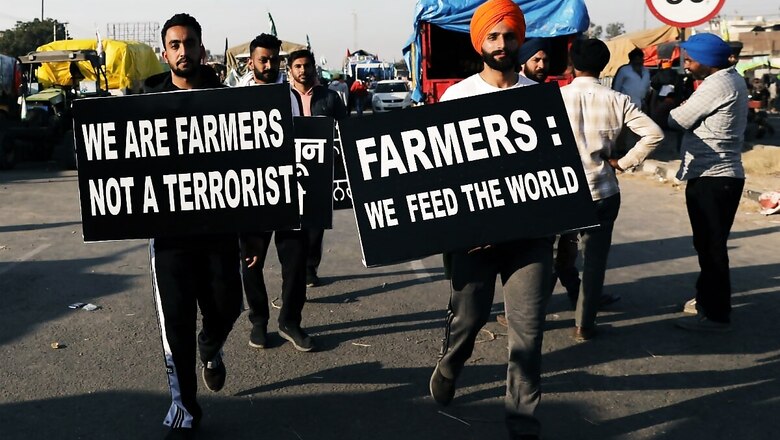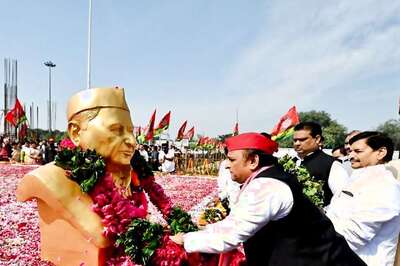
views
The Tuesday meeting between the government and the agitating farmers’ representatives failed to resolve the issue, as the latter declined the Centre’s to set up a committee to discuss the new farm laws. Given the obstinate attitude of the farmers’ leaders, the outcome of the meeting is not astonishing. What, however, is astonishing is the fact that these self-serving leaders have managed to generate widespread support, not just among the agriculturists in north India but also in other countries. Non-resident Indians are supporting the misguided movement; so is Canadian Prime Minister Justin Trudeau.
The farmers’ leaders are obstinate because the three laws—the Farmers Produce Trade and Commerce (Promotion and Facilitation) Act, the Farmers (Empowerment and Protection) Agreement Act, and the Essential Commodities (Amendment) Act—they are protesting against are enabling provisions, not restrictive stipulations. These laws free the farmer from the provisions that force him to sell his produce in mandis. Also, he can deal with big corporations which offer lucrative deals.
By the way, marketing reforms is not something that the Narendra Modi government has conceived. A lot of experts, both who served this government and the previous ones, have been favouring market reforms in agriculture for quite some time. For instance, the Economic Survey 2012-13 recommended liberalisation: “In order to bring about reforms in the [organised marketing] sector, a model Agricultural Produce Marketing (Development and Regulation) (APMC) Act was prepared in 2003. Though the process of market reforms has been initiated by different state governments through amendments in the present APMC Act on the lines of Model Act, many of the states are yet to adopt the Model Act uniformly. It is therefore necessary to complete the process of market reforms early in order to provide farmers an alternative competitive marketing channel for transaction of their agricultural produce at remunerative prices.”
The Modi government has done what the Congress-led UPA regime’s Economic Survey had recommended. Yet, the grand old party is vociferously opposing the new farm laws. “The Modi government tortured farmers. First, they enacted black laws and then used force and then lathi-charged them. But they forgot that when farmers raise their voice, then it resonates across the country. Join us through the #SpeakUpForFarmers campaign against the exploitation of our brother and sister farmers,” Rahul Gandhi tweet in Hindi.
Priyanka Vadra Gandhi also expressed similar sentiments in her tweet in Hindi. “The name is farmer’s law but all the benefits go to the billionaire friends. How can farmer laws be formulated without talking to farmers? How can their interests be ignored while making these laws? The government will have to listen to the farmers. Let us support farmers. #SpeakUpForFarmers.”
While politicians take decisions to further their partisan ends, the leaders of various sections of society should promote the interests of the people they claim to represent—farmers in this case. But, unfortunately, the farmers’ leaders are behaving like professional revolutionaries, who dogmatically oppose everything, rather than genuine community leaders.
In fact, their stubbornness reminds me of an essay the famous Hindi satirist Hari Shankar Parsai wrote long ago. In it, he had expressed his wonderment over a bizarre sight—many women opposing the Hindu Code Bills. The proposed laws in the 1950s were aimed at women emancipation; they would criminalise polygamy, give equal right to females in Hindu society, and so on. The conduct of the so-called farmers’ leaders would also have shocked Parsai.
In the ultimate analysis, the stir boils down to a couple of points—or, to be precise, concerns: the minimum support price (MSP) will be done away with; and big ‘corporates’ will enter the arena and exploit the ‘poor farmer.’
Both concerns are bogus. To begin with, the very efficacy of MSPs is suspect. This is the reason that experts tolerate rather than recommend MSPs. Second, the MSP system covers a small fraction of Indian agriculture—anywhere between 6 per cent and 15 per cent. Third, the government doesn’t need any laws to abolish MSPs; it can do that by an executive order.
Finally, and most importantly, neither the government announced any abolition of MSPs nor is there anything on the cards to suggest that it would do so. No less a person than Prime Minister Narendra Modi has said categorically that MSPs would continue. Yet, the canard persists.
As for the big corporations exploiting farmers, the fear is not just phony but also symptomatic of extant hypocrisy in society. Multinational corporations and other big companies are good when we buy their goods and services; they are also good when our family members are employed by them. Any Indian would give their right arm if this could get their son or daughter a job in a big company, for such companies pay well and treat their employees better than small traders do. A very rational choice.
The author is a freelance journalist. Views expressed are personal.
Read all the Latest News, Breaking News and Coronavirus News here




















Comments
0 comment